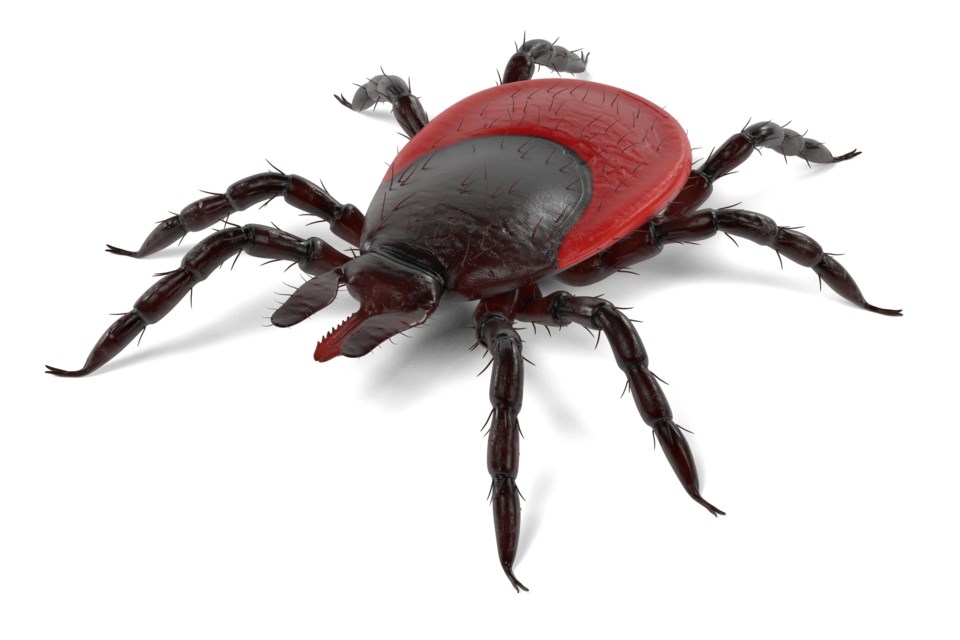NEWS RELEASE
SIMCOE MUSKOKA DISTRICT HEALTH UNIT
*************************
SIMCOE MUSKOKA - Public Health Ontario’s Lyme Disease Map, which outlines estimated risk areas where blacklegged ticks have been found, is anticipated to include a second area within Simcoe Muskoka next year.
During the spring and fall of this year, tick dragging was conducted along the Amos Tract in Oro-Medonte and blacklegged ticks were identified in both seasons. Repeated occurrences of the species indicates they may be establishing in the area, and as a result, the potential risk of the ticks carrying the bacteria responsible for Lyme disease may also be increasing.
Blacklegged ticks can carry and transmit Borrelia burgdorferi, the bacteria responsible for causing Lyme disease.
Although it is not known if the ticks found in estimated risk areas carry Lyme disease, it is important for people spending time in wooded or grassy areas to be aware of this and take appropriate precautions.
Estimated risk areas are identified through active surveillance, otherwise known as “tick dragging.” These areas are calculated from the location where blacklegged ticks are found and include communities within a 20-kilometre radius surrounding that location.
This year, the township of Oro-Medonte, City of Orillia as well as parts of the City of Barrie, Tiny, Tay, Springwater and Severn townships will be included within this estimated risk area.
In fall of 2017, Awenda Provincial Park and surrounding communities were identified as an estimated risk area and were included in Public Health Ontario’s Risk Map in 2018.
“Because of the numbers of ticks submitted in the past by individuals in the community, tick dragging was conducted along the Amos Tract because we wanted to better understand the potential exposure risks the public may have to blacklegged ticks in this area of Simcoe County,” said Dr. Charles Gardner, Medical Officer of Health for the Simcoe Muskoka District Health Unit.
“Although ticks tend to be more active during the spring and summer, they can also be active in late fall and early winter when temperatures rise above freezing,” said Dr. Gardner. For this reason, people should continue to exercise caution when they’re out in wooded or grassy areas. Proper personal protection is key.
Ticks can be found in wooded areas with long grasses and leaf litter. The following is recommended to protect against being bitten by ticks when spending time in wooded or grassy areas.
- Wear light coloured pants, long sleeved tops, closed footwear and tuck your pants into your socks.
- Use an insect repellent containing DEET or icaridin.
- After being in such areas, search your body for ticks, especially the groin, scalp, back and underarm areas and quickly remove attached ticks.
- Shower within two hours after being in such areas.
- Check your pets for ticks after they have been in such areas as they may carry ticks into your home after you have been outdoors.
“We anticipate that the habitat for blacklegged ticks will spread over time due to our climate becoming more suitable to support the establishment of ticks in our area.” Dr. Gardner added. “Finding ticks in this area serves as a reminder that blacklegged ticks are present in Simcoe Muskoka and that people should take precautions to protect themselves against being bitten by ticks.”
In Ontario, only the blacklegged tick can transmit the bacteria responsible for causing Lyme disease. Not all blacklegged ticks are infected with the Lyme disease causing bacteria, so not all tick bites will spread Lyme disease. If a tick is infected, it needs to be attached to you for at least 24 hours to cause Lyme disease. Prompt removal of ticks is important to reduce your risk.
For more information on Lyme disease and the ticks that carry it, visit the health unit’s website at www.smhdu.org, or call Health Connection at 705-721-7520 or 1-877-721-7520 weekdays from 8:30 a.m. to 4:30 p.m.
*************************



